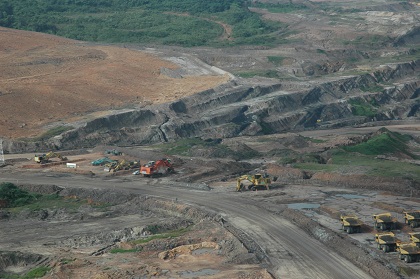From Burke to Bumi - a UK-Indonesian scandal
Published by MAC on 2012-10-02Source: Nostromo Research
London Calling asks why the warnings weren't heeded
It's too soon to claim that Bumi - the world's largest single miner of dirty coal - is about to go bust (See: Bumi Burns Hole in London's Reputation)
 |
| Crushing Borneo’s forests: one of Bumi’s coal mines in East Kalimantan - Photo: Walhi |
However, recent revelations of a huge accounting scandal at the heart of the UK-Indonesian company, serve to underscore an important reality.
A relatively sparse number of individuals and groups - mostly untutored in financial matters - had struggled to expose the rot at the heart of this enterprise, long before it was listed on the London Stock Exchange last year.
Their warnings were almost totally disregarded.
Concerns stemmed from many direct experiences of the moral delinquencies for which Jakarata's Bakrie family - later joined by Nat Rothschild's Vallar to form Bumi plc - has been culpable for well over a decade.
Nor was this testimony confined to the Bakrie's leading role in creating Indonesia's worst recent environmental "accident", the Lapindo mud-flow disaster (See: Bumi Burns Hole in London's Reputation)
Equally important, campaigners exposed the environmental devastation, the forced removals of farmers, and attacks on workers, caused by the family firm since it took over East Kalimantan's Kaltim Prima Coal (KPC) mines in 2003.*
Arguably, the most important indication of the ignominious failure by Bumi plc (and its Indonesian affiliate, PT Bumi) to address these issues, occurred during June's Bumi plc annual general meeting in London.
On that occasion, the chair and board refused answering any questions related to the damaging activities of KPC, although some shareholders urgently needed to "spill the beans".
This intransigence was all the more culpable, given the company's annual report proudly boasts that, "with our interests in PT Berau and PT Bumi, we have created on a 100% basis (sic) the largest thermal coal producer in the world". See: The Indonesian mining scandal at the heart of UK capital
From Burke to Bumi
Edmund Burke, a leading 18th century English liberal thinker and politician, has been attributed as saying: "The only thing necessary for the triumph of evil is for good men to do nothing".
Almost certainly he never used these exact words.
Nonetheless, in his 1770 Thoughts on the Cause of the Present Discontents, Burke did write that: "When bad men combine, the good must associate; else they will fall, one by one, an unpitied sacrifice in a contemptible struggle".
What then, have the great - as well as "good" - done, to curb the activities of this particular combine as it became a "prima inter pares" in the heart of global mining capital-raising?
It's not only banks and investment funds, financial (specifically stock exchange) regulators, and the media at large, who failed to read the writing on the wall.
Outside of Indonesia itself, there was hardly a peep of concern from any influential environmental and human rights NGOs, nor from lobby groups working to combat adverse climate change.
Virtually none of them acknowledged that, as the "largest thermal coal producer in the world", Bumi is thereby guilty of an egregious contribution to global greenhouse gas emissions.
Belatedly, the Bakries and their cronies (including Bumi's UK directors) are now shown to be at the heart of - if not directly responsible for - massive financial corruption.
This will come as little surprise to campaigners who 've long tried exposing the company's deeply-ingrained moral lassitude, and the many socio-environmental derelictions deriving from it.
They eagerly awaited this week's report by the UK Financial Services Authority (FSA), which promised (as Reuters puts it) new proposals "to protect investors and ease concerns that London-listed companies such as Bumi....are diluting standards of corporate governance". (From Bumi Burns Hole in London's Reputation).
But, whatever changes following this report, campaigners still have a hard drive ahead of them. They need to convince legislators that the protection of people, and preservation of sustainable livelihoods, are the fundamental priorities, while mere safeguarding of financial assets comes a long way behind.
Indeed, unless the first two provisions are met, promoting "better corporate governance" is a chimera.
As the coordinator of Indonesia's mining advocacy group, Jatam, said this week:
"We are shocked that so much attention is being paid to financial irregularities within Bumi plc and PT Bumi Resources, compared to the little attention being paid to tens of thousands of people affected by these companies' activities in Indonesia".
--
* Readers can access some of these accusations at:
Dark Materials: the consequences of clinging to coal
Indonesia's KPC denies operating in forest areas
KPC Using Forces to Intimidate United Farmers
[London Calling is published by Nostromo Research. Views expressed in this column do not necessarily reflect those of any other person or organisation. Reproduction, or citation, with acknowledgment to the author, is welcomed under a Creative Commons Licence].